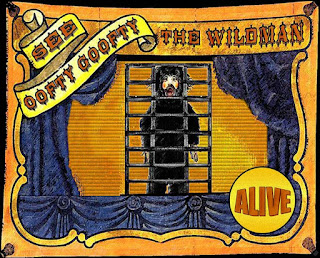I woke shortly
after sunrise. The landscape outside had
changed during the night. The undulating
prairies had given way to rolling hills and rocky outcroppings as we approached
the Rocky Mountains. I was
enthralled. We were getting into cowboy
country.
I was hungry and
feeling the call of nature. I made my
way slowly through the swaying car to the lavatory at the end. For a country boy fresh from a two-holer outhouse,
the train lavatory was opulent. The sink
was marble with gleaming brass fittings and there was a fancy light up beside a
gilt-framed mirror. I wondered where
electricity and hot and cold running water came from on the train. The toilet was flushed by a foot
treadle. I was fascinated by the fact
that the treadle simply opened a flapper valve and, peering down, I could see
the ties flashing past. Now I knew the
reason for the sign that said “Do Not Flush While Train is in Station.”
I washed my face
and combed my unruly mop of hair, then made my way across an open platform into
the dining car. It was a bit overwhelming. Each table was set with a white linen cloth,
heavy silverware, white coffee cups with gold rims, and water glasses that must
have been crystal.
There were few
passengers in the diner at that early hour.
I took a seat at the nearest empty table. The white-coated black waiter, flashing his
white teeth in a big smile, placed the menu in front of me with a flourish and
a “Mawnin’, young suh!”
He waited while I studied
the menu. I was appalled at the
prices. At home in Greenfield a complete
breakfast of eggs, bacon, fried potatoes, toast, juice and coffee could be had
for 35 cents—twenty-five cents without the juice. You could also get a hamburger for a
dime. Here on the train, a glass of
juice was twenty cents alone and a bacon and egg breakfast was seventy-five
cents. On the lunch part of the menu, a
hamburger was fifty-five cents.
I surreptitiously
felt of my pocket where, after the movie in Kansas City, I had little more than
four dollars to see me to Portland which was still two and a half days
away. I squirmed uncomfortably in my
chair. “We-ell,” I said, “I am not very
hungry. I’ll just have a glass of milk
and some toast, I think.”
The waiter never
batted an eye but I realized later that he knew the reason for my
discomfort. He smiled, “You sho’ that’s all?” When I nodded wordlessly, he leaned down
before he turned away and said in a low voice, “Tell you what—when we gets the
folks from the Pullmans fed, Ah’ll be comin’ through the coach with some sandwiches—they
is only two bits apiece.” Then he turned
away to get my milk and toast which was going to total thirty cents here in the
dining car.
The black waiter
was not only as good as his word, he was better. About an hour and a half later he did indeed
come through the coaches with a tray of ham and beef sandwiches. When I held up my hand and dug out a quarter,
he flashed that big grin again. Without
asking my choice, he pulled a sandwich from the bottom of the pile. Instead of cold ham or beef, it was a bacon
and egg sandwich still warm from the grill.
After that I did
not go near that expensive diner but bought sandwiches three times a day and
sometimes a bottle if pop when a vendor came through. A grape NeHi was a dime instead of a nickel
that my grandpa charged at his store.
There was not much
else during the trip that made a deep enough impression on me for me to
remember more than fifty years later. I
recall that there was a boy a couple of years older than me sitting across the
aisle. We struck up an acquaintance and would
sometimes get off and stretch our legs when the train was in a station. I still remembered that other trip when I
thought the train was going to leave my mother behind so, even though I now
knew that the train would not leave until the whistle blew and the conductor
call, “All aboard!”, we never wandered very far from our coach.
I do recall one
scene clearly the second day out, probably somewhere in Wyoming. I knew that I was finally “out west”. There was a dirt road paralleling the
railroad track. I watched as we passed a
man wearing a wide-brimmed cowboy hat and driving a buckboard behind a spirited
team of horses. Behind him loped a young
fellow on a pinto rocking along in a silver-mounted saddle. I was a bit disappointed that he did not seem
to be packing a six shooter.






























